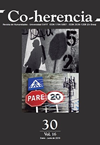The obsession with memory regarding the synchronicity of mnemonic media
Main Article Content
Keywords
memory culture, postmemory, technique, mass media, synchrony, consumer society, philosophy of history
Abstract
This paper aims to offer an interpretation of the conditions and implications of the memory culture that has characterized, since the eighties, the relations that Western societies maintain with their past. Drawing on the philosophy of history, but using conceptual tools from other fields, we interpret the limits of this emphasis on the past based on the peculiarities of the material media that have enabled it. This thesis rejects the understanding of this memory boom either as an attempt to establish a premodern relationship with the past or as a mere reaction to the crisis of the future, evidenced in the late the 20th century. Rather, we construe it as a movement to counter the application of an obsolescence pace, which is characteristic of the current western model of information consumption, to our past.
Downloads
References
Assmann, A. (2013). Transformations of the modern time regimen. En C. Lorenz y B. Bevernagr (Eds.), Breaking up Time. Negotiating the Borders between Present, Past and Future (pp. 39-56). Gotinga: Vandenhoeck & Ruprecht.
Assmann, A. (2017). Reframing memory. Between individual and collective forms of constructing the past. En K. Tilsman, F. van Vree y J. Winter (Eds.), Performing the Past. Memory, History, and Identity in Modern Europe (pp. 37-51). Amsterdam: Amsterdam University Press.
Assmann, J. (2011). Cultural Memory and Early Imagination. Writing, Remembrance, and Political Imagination. Cambridge: Cambridge University Press.
Augé, M. (2009). Las formas del olvido. Barcelona: Gedisa.
Barnet, B. (2003). The erasure of technology in cultural critique. The Fibreculture Journal, (1). Recuperado de http://one.fibreculturejournal.org/fcj-005-the-erasure-of-technology-in-cultural-critique
Boym, S. (2015). El futuro de la nostalgia. Madrid: Antonio Machado Libros.
Castells, M. (2005). La era de la información. Vol. I. Madrid: Alianza.
Derrida, J. (1997). Mal de archivo. Madrid: Trotta.
Freud, S. (2015), “Inhibición, síntoma y angustia”. En El yo y el ello y otros escritos de metapsicología (pp. 63-167). Madrid: Alianza.
Green, A. (2001). El tiempo fragmentado. Buenos Aires: Amorrortu.
Gumbrecht, H. U. (2010). Lento presente. Sintomatología del nuevo tiempo histórico. Madrid: Escolar y Mayo.
Halbwachs, M. (2004). La memoria colectiva. Zaragoza: Prensas Universitarias Zaragoza.
Hartog, F. (2007). Regímenes de historicidad. Presentismo y experiencia del tiempo. Ciudad de México: Universidad Iberoamericana.
Hartog, F. (2012). Sobre los regímenes de historicidad. En F. Dosse (Ed.), Historicidades. Buenos Aires: Waldhuter ediciones.
Hirsch, M. (2008). The generation of postmemory. Poetics Today, 29(1), 103-128. DOI: 10.1215/03335372-2007-019
Huyssen, A. (1995). Memorias crepusculares. La marcación del tiempo en una cultura de amnesia. Buenos Aires: Prometeo Libros.
Huyssen, A. (2007). En busca del futuro perdido. Cultura y memoria en tiempos de globalización. Buenos Aires: Fondo de Cultura Económica.
Koselleck, R. (1993). Futuro-pasado. Para una semántica de los tiempos históricos. Barcelona: Paidós.
Mate, R. (2003). Memoria de Auschwitz. Actualidad moral y política. Madrid: Trotta.
McLuhan, M. (1996). Comprender los medios de comunicación. Las extensiones del ser humano. Buenos Aires: Paidós.
Pérez Baquero, R. (2016). Historia y trauma colectivo: límites, usos y abusos. Oximora, (8), 131-147.
Platón. (2015). Fedro. En Diálogos. Madrid: Gredos.
Ramos Torre, R. (1989). Maurice Halbwachs y la memoria colectiva. Revista de Occidente, (100), 63-81.
Ricoeur, P. (1999). La lectura del tiempo pasado. Memoria y olvido. Madrid: Ediciones Universidad Autónoma.
Ricoeur, P. (2004). Tiempo y narración. Vol I. Buenos Aires: Siglo XX.
San Agustín de Hipona. (2015). Confesiones. Madrid: Gredos.
Simondon, G. (2008). El modo de existencia de los objetos técnicos. Buenos Aires: Prometeo libros.
Stiegler, B. (1996). La técnica y el tiempo. Vol. 2. Gipuzkoa: Argialezche Ira.
The Onion (1997, 4 de noviembre). U.S. Dept. of Retro Warns: “We may be running out of past”. https://politics.theonion.com/u-s-dept-of-retro-warns-we-may-be-running-out-of-pas-1819564513
Van Dijck, J. (2007). Mediated Memories in the Digital Age. California: Stanford University Press.
Winter, J. (2001). The generation of memory: Reflections on the “Memory Boom” in Contemporary Historical Studies. Canadian Military History, 10(3), 57-66. Recuperado de https://scholars.wlu.ca/cmh/vol10/iss3/5




